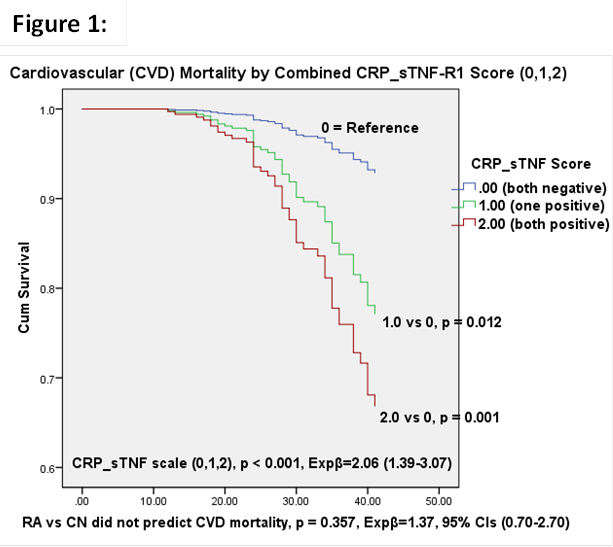Session Information
Session Type: ACR Poster Session A
Session Time: 9:00AM-11:00AM
Baseline Serum Inflammatory Biomarkers at Cohort Entry in 1974 Predicted Cardiovascular Disease (CVD) Mortality from 1995 through 2015 in a Prospective, Community-Based Study of Incident Rheumatoid Arthritis (RA) Patients and Matched non-RA (CN) Subjects Author Block: Alfonse T. Masi1, Azeem A. Rehman2, Laura C. Jorgenson1, Jean C. Aldag1, 1University of Illinois College of Medicine at Peoria, Peoria, IL. 2University of West Virginia, Morgantown, WV.
Background/Purpose: Inflammatory pathways have been incriminated in total and cardiovascular disease (CVD) mortality of rheumatoid arthritis (RA) patients (Arthritis Rheum. 2005 Mar;52(3):722-32). Current studies have analyzed serum inflammatory biomarkers in RA patients as related to total and CVD mortality outcomes. No reports are available on serum inflammatory biomarkers before clinical onset of RA as related to total or CVD mortality outcomes. The aim of this study is to investigate baseline pre-clinical inflammatory biomarkers as related to all-cause and CVD mortality of incident RA cases and matched non-RA comparison (CN) subjects in a long-term prospective cohort.
Methods: All incident RA cases were identified who had onsets between 1977 and 1995 from a 1974 community cohort (n=21,061 adults) and satisfied 1987 revised ACR criteria. Cases (n=54) were matched (1 RA: 4CN) with 216 cohort CN subjects on age, gender, and race (Caucasian). All subjects (N=270) were regularly followed for survival through 2015. Two investigators independently determined causes of death (CODs) from the completed death certificate codes without knowledge of RA vs CN status. Baseline (1974) serum immunologic factors were anonymously assayed at national referral laboratories. Assay values were log-transformed and standardized by z-scores in females and males. Multiple imputation (MI) was utilized to enter a minority of randomly missing biomarker z-scores. Individual biomarker z-scores were also analyzed as ranks (1= lowest, 5= highest) within the 54 separate matched sets of 1 RA and 4 CN. Logistic regression was used to identify ranked variables which predicted mortality outcome through 2015, in total deaths and by CVD, respiratory, malignancy, and all other CODs. The dichotomized (neg=0, pos=1) z-scores of predictive ranked factors were entered as covariates in Cox regression models in addition to 1974 baseline demographic and CN_RA status. Pairs of independent dichotomous (neg/pos) selected z-scores were combined (0=both negative, 1=either positive, 2=both positive) to enhance mortality prediction.
Results: In all subjects, total mortality was predicted by ranks of C-reactive protein (CRP) (p=0.033, Exp β 1.17, 95% CIs 1.03-1.33). The CVD deaths were predicted by ranks of soluble tumor necrosis factor receptor 1 (sTNF-R1) (p=0.001 Exp β 1.41, 95% CIs 1.14-1.75) in Cox regression models, including baseline demographic covariates. The dichotomous (neg/pos) z-scores of the preceding predictive biomarkers were paired (CRP_sTNF-R1) into a 3-scale score, which significantly predicted total mortality (p=0.002, Exp β 1.42, 95% CIs 1.13-1.78). That paired predictive biomarker (CRP_sTNF-R1) was an even stronger predictor of CVD mortality (p<0.001, Exp β 2.06, 95% CIs 1.39-3.07) (Figure 1). Its Exp β was slightly greater for RA [2.97 (0.97-9.09)] than CN [1.98 (1.27-3.10)], but was significant (p=0.003) only in the larger sample of CN subjects. Excluding the preceding 50 CVD deaths, the paired biomarker did not predict (p=0.130) total mortality in 220 remaining subjects (Figure 2). In the 220 non-CVD subjects, mortality differed slightly (p=0.045) between those who had neither vs both dichotomous z-scores positive. As found in our previous analyses, RA vs CN status did not predict (p=0.357) 50 CVD deaths [Expβ=1.37 (0.70-2.70)] (Figure 1), but did significantly (p=0.003) predict all other-cause mortality combined in the remaining 220 subjects [Expβ=2.10 (1.29-3.41)] (Figure 2). The paired biomarker was not a significant predictor of the separate non-CVD CODs.
Conclusion: Ranks (1-5) of serum CRP and sTNF-R1 z-scores significantly predicted either total or CVD mortality in 270 subjects. A 3-scale pairing of the preceding dichotomous z-scores (CRP_sTNF-R1) significantly (p<0.001) predicted CVD mortality, but not (p=0.130) non-CVD mortality in the remaining 220 subjects. The relation of pre- and post-clinical onset serum inflammatory biomarkers to total, CVD, and other cause-specific mortality deserves further study in RA and CN subjects.
 |
||
 |
||
To cite this abstract in AMA style:
Masi AT, Rehman AA, Jorgenson L, Aldag JC. Baseline Serum Inflammatory Biomarkers at Cohort Entry in 1974 Predicted Cardiovascular Disease (CVD) Mortality from 1995 through 2015 in a Prospective, Community-Based Study of Incident Rheumatoid Arthritis (RA) Patients and Matched Non-RA (CN) Subjects [abstract]. Arthritis Rheumatol. 2016; 68 (suppl 10). https://acrabstracts.org/abstract/baseline-serum-inflammatory-biomarkers-at-cohort-entry-in-1974-predicted-cardiovascular-disease-cvd-mortality-from-1995-through-2015-in-a-prospective-community-based-study-of-incident-rheumato/. Accessed .« Back to 2016 ACR/ARHP Annual Meeting
ACR Meeting Abstracts - https://acrabstracts.org/abstract/baseline-serum-inflammatory-biomarkers-at-cohort-entry-in-1974-predicted-cardiovascular-disease-cvd-mortality-from-1995-through-2015-in-a-prospective-community-based-study-of-incident-rheumato/
